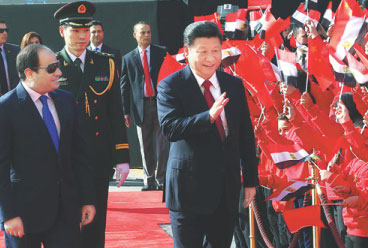Xi outlines Middle East vision
President says China seeks to build cooperative partnership network for 'win-win outcomes'
China and Arab states should build peace, promote development, boost industrialization, support stability and partner people-to-people exchanges in the Middle East, President Xi Jinping said on Thursday.
Addressing the Arab League headquarters in Cairo, he said China decides its position on issues based on their merits and the fundamental interests of the people in the Middle East.
"Instead of looking for a proxy in the Middle East, we promote peace talks; instead of seeking any sphere of influence, we call on all parties to join the circle of friends for the Belt and Road Initiative," Xi said.
He added that instead of attempting to fill a "vacuum", China seeks to build a cooperative partnership network for "win-win outcomes".
The president said there is hope in the Middle East and all parties should look for it by pursuing dialogue and development.
"The Palestinian issue should not fall into oblivion, and we must bring hope to the Palestinian people as early as possible," Xi said.
Earlier on Thursday, China and Egypt signed 21 documents on cooperation, endorsing a five-year plan to boost two-way ties and pledging to co-build the trans-Eurasia Belt and Road Initiative.
The initiative was put forward by Xi in 2013 with the aim of promoting common development along the ancient land and maritime Silk Roads.
Xi and his Egyptian counterpart Abdel-Fattah al-Sisi also jointly unveiled the nameplate for the second phase of the China-Egypt Suez Economic and Trade Cooperation Zone.
The zone has attracted many Chinese manufacturers by offering preferential policies.
Making the second stop on his three-nation Middle East visit, Xi arrived in Cairo on Wednesday amid rising calls from observers for Egypt's thirst for infrastructure and connectivity development to be better addressed.
Sisi greeted Xi with a welcoming ceremony that included a 21-cannon salute before their official talks on Thursday morning.
Other pacts were signed in fields that included electricity, infrastructure, trade, energy, finance, aviation and culture.
Xi suggested that the two countries focus on cooperation in infrastructure construction and production capacity and turn Egypt into a hub under the Belt and Road Initiative.
Xi said China is ready to take part in building major Egyptian projects such as the Suez Canal Corridor - a new channel parallel to the current canal - and the new administrative capital city.
Sisi thanked Xi for inviting him as a guest nation leader to attend the G20 summit in Hangzhou, Zhejiang province, in September.
The Egyptian leader said Cairo is ready to link its own development planning to the Belt and Road Initiative and boost infrastructure cooperation within the framework of the Asian Infrastructure Investment Bank.
An Huihou, a former Chinese ambassador to Egypt, said, "The top priority for the Egyptian administration is to develop its economy, expand employment and reinvigorate people's livelihoods."
An added, "The Egyptian economy has maintained growing momentum despite a number of difficulties". Annual GDP growth of 4.5 percent was reported last year.
Li Guofu, a researcher of Middle East studies at the China Institute of International Studies, said that Egypt "has offered protocols of a very high level" in greeting Xi, who had been accompanied by Sisi to many events during his visit.
|
Children cheer as Egyptian President Abdel-Fattah al-Sisi walks with President Xi Jinping at the presidential palace in Cairo on Thursday. Reuters |



















